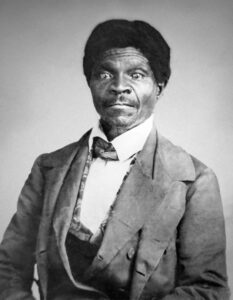The Supreme Court, of the federal United States, hands down Scott v. Sandford, (a.k.a. the “Dred Scott decision”), declaring that slaves have no right to file suit in federal court to obtain their freedom:
They [persons who are the descendants of Africans who were imported into this country and sold as slaves] had for more than a century before been regarded as beings of an inferior order, and altogether unfit to associate with the white race, either in social or political relations; and so far inferior, that they had no rights which the white man was bound to respect; and that the negro might justly and lawfully be reduced to slavery for his benefit.
Also discussed in this decision, but less well known is the position that one’s citizenship is determined by the State, and not the federal government:
[P]revious to the adoption of the Constitution of the [u]nited States, every State had the undoubted right to confer on whomsoever it pleased the character of citizen, and to endow him with all its rights. But this character, of course, was confined to the boundaries of the State, and gave him no rights or privileges in other States beyond those secured to him by the laws of nations and the comity of States. Nor have the several States surrendered the power of conferring these rights and privileges by adopting the Constitution of the [u]nited States. Each State may still confer them upon an alien, or anyone it thinks proper, or upon any class or description of persons… .
NOTE: In arriving at its decision, the Court relied on case law from Connecticut that forbade citizenship to freedmen; and completely ignored case law from North Carolina, and Rhode Island and Providence Plantations that allowed provisions for freedmen to qualify for citizenship.
[restored 2/25/2022]
Maybe this is why my law school professor told us in 1978 that, “The law is what the (supreme) Court says it is.” I objected, and I still do today, 1/21/2003. I agree with Justice Curtis, though we are not yet, or again, in the majority. —- JL
Subsequent Events:
Authority:
Article IV, Section 2 [Clause 1]
ccc-2point0.com/constitution-for-the-united-states
Article VI [Clause 2]
ccc-2point0.com/constitution-for-the-united-states
Article X of Amendment
ccc-2point0.com/constitution-for-the-united-states
“Law of the Jungle”
ccc-2point0.com/preface
References:
Calvin D. Linton, ed. The Bicentennial Almanac: 200 Years of America, 1776-1976, (Nashville, Tennessee: Thomas Nelson, 1975), 150.
“Today in History,” Orange County (California) Register, 6 March 2011, News:19.
Debate Is Taboo on the Great Centralizer, Lincoln by John Avery Emison
www.lewrockwell.com/orig11/emison1.1.1.html


